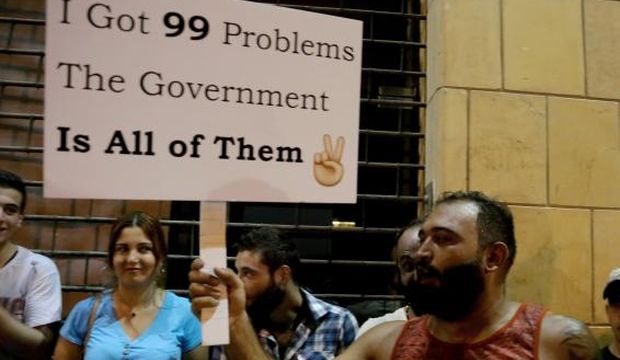From Egypt to Lebanon and Iraq, we are seeing a resurgence in street mobilization. Each of the protest movements in these countries are calling for the state to once again fulfill its proper role, after people have suffered as a result of politicians’ attempts to turn these countries into “nation slums” ruled by militias who have created new forms of violence, terror, murder, and intimidation.
In Iraq we are seeing anti-corruption protests on an almost weekly basis. The demonstrators are also calling for political reforms and better public services in Baghdad, and the protests coincide with the dire security situation in the Anbar province and Iraq’s second city Mosul, both of which have been overrun by the Islamic State of Iraq and Syria (ISIS).
Meanwhile in Lebanon something similar is happening with the #YouStink protest movement—whose name refers to the garbage crisis that has blighted the capital Beirut, with piles of trash accumulating in the city for months without being removed.
In Egypt, where the state has only just caught its breath after attempts to abduct it during the period of Muslim Brotherhood rule, the government has characterized the accumulating garbage problem as a “matter of national security.” I believe they are actually correct in this assessment.
This phenomenon of the deterioration of the state and its failure to fulfill its role in a number of Arab countries is due to a variety of factors. It has had an effect on large, highly populated cities such as Cairo, Beirut and Baghdad, which have lost the beauty they boasted only two decades ago. Ugliness is now sadly the norm in these cities: piles of garbage and other images of decay and neglect. It is almost as if the task of cleaning the streets has become so difficult that it can only be accomplished by acquiring some unattainable technological marvel.
These images are clear to see in many Arab cities; all you need to do is take a stroll through one of them and you will get a sense of their governments’ failure of management: traffic chaos, garbage, lack of cleanliness, failing electricity and water supplies—all of which are also related to other major economic problems, chief among them youth unemployment.
Again, many factors are responsible for the deterioration in public services in many of these countries over the last decades, from bloated and inefficient bureaucracies to widespread, endemic corruption. We have reached the stage where the simple process of collecting garbage and disposing of it has become some kind of logistical nightmare for the state. But there is another factor responsible—and here, society as a whole, and not just the state, is to blame: the proliferation of militias. In some of these countries people and governments have allowed militias not only to grow, but also to begin rivalling the state itself by carrying out “parallel” public services which are solely the responsibility of the former. Garbage collection, for example, requires an entity that is not only organized but which also has teeth, so to speak, and is able to punish transgressors and engender respect. The problem is, however, that these groups, while they inspire loyalty and have prestige, only give power to themselves, which they attain on ideological and sectarian grounds. Moreover, where they do perform public services they do so only partially—and only for people belonging to their sect or who support their ideology.
The garbage problem is a symptom of an underlying political problem in these countries, and which has emerged in the wake of the Arab Spring—now wilting into an Arab Winter. These societies have entered into internal conflicts which have more-or-less obliterated the state, which has simply become an agent of division and in some cases has been co-opted by extremist groups whose only goal is to spread chaos.
The current protests in these countries are a positive development and a step in the right direction. Militias have no right to impose their control over societies and entire countries. The spread of such groups in these countries is therefore a lesson we can learn from, since the deterioration in governance is something that has been happening for decades. Countless protests have taken place without obtaining any tangible results. And we can see how the “resistance,” personified by groups such as Hezbollah in Lebanon, has created a never-ending cycle of sectarian violence.
There were of course choices made by these governments to develop their economies which were unsustainable and resulted in state institutions being unable to continue to secure enough resources to carry out public services effectively. This has helped create a suitable environment in which violent groups can flourish. When the nation state fails, such groups grow and take its place.
These protests we are now seeing, which call for an improvement in such basic and essential public services as garbage collection, show that people are tired of the state’s long absence and desire its timely return to restore some semblance of order to these societies.
